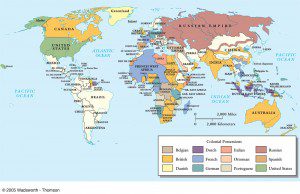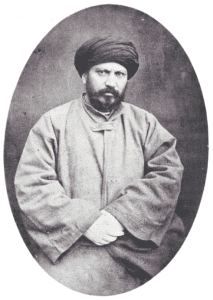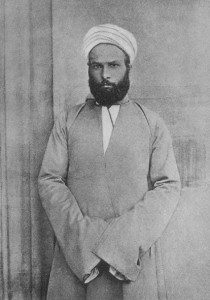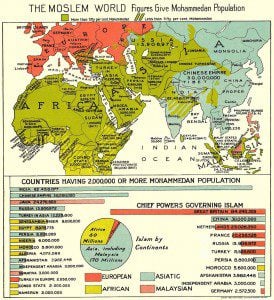I have recently been posting on the astonishingly widespread influence of Freemasonry both in Anglo-American culture, and in Continental Europe. But that global influence went even further, into some regions and contexts that today seem almost incredible.
To illustrate this, I turn to the origins of modern Islamic thought. At the end of the nineteenth century, Islam worldwide was in a parlous condition, as the vast majority of the world’s Muslims fell under the rule of European empires. The largest “Muslim nations” were the British, Dutch and French empires. Muslim thinkers could not agree how to confront the overwhelming challenge of Western Christian modernity. Should Islam imitate the West? Should it revert to its original sources, in a kind of fundamentalist revival?
The key figure in the Islamic revival was Sayyid Jama ̄l ad-D ̄ın, known from his origin as al-Afghani, who is the ultimate source of much modern Islamist thought and activism. From the 1860s through the 1890s, al-Afghani roamed freely across South Asia, the Middle East, North Africa, and even Europe. In American terms, he was a Johnny Appleseed character, wandering the world sowing reformist ideas. He urged Muslims to unite and use the latest technology to resist the Europeans before they reduced the whole Middle East to the subservient condition of India.
I discuss al-Afghani in my book The Great and Holy War, and there is an important account in Pankaj Mishra’s recent work From the Ruins of Empire: The Intellectuals Who Remade Asia.
The influence of al-Afghani’s many disciples and pupils survives today, through men like Egypt’s Muhammad Abduh. Although many were liberal modernizers, they adopted the title of Salafi, claiming that they were returning to the pure principles of the early faith – but not in the simplistic or mechanical way of many modern-day practitioners. Some urgently wanted to revive Islamic dawa (preaching, or missionary efforts), both to convert non-Muslims and to draw weaker Muslims into purer versions of faith.
So al-Afghani is critical to understanding the modern global order. I mention him here because of a surprising connection with my earlier themes. Curiously, he and his followers resembled their Western progressive counterparts in using Freemasonry as a vehicle for spiritual reform, and al-Afghani operated through Egypt’s Masonic lodges. He was even the head of that movement in Egypt. (This Masonic context was explored in a major scholarly study in A. Albert Kudsi-Zadeh, “Afghānī and Freemasonry in Egypt,” Journal of the American Oriental Society, 1972).
The connection requires a bit of explanation. Of itself, there is nothing strange about Muslim involvement in Masonry. Muslims are strict monotheists, and they are very comfortable in a mythological system that harks back to Solomon or Suleiman, their great prophet. They encountered at least two separate traditions of Masonry – the British in India, and the French in Egypt – and they naturally gravitated to these movements dedicated to progress, education, modernity and fellowship.
In the late nineteenth century context, Freemasonry had a special appeal for people living in repressive Muslim regimes like Persia. Government and police frowned on any private clubs and societies that might promote sedition, but Masonic lodges offered safe space for discussion and what we would today call networking. This was particularly important in a world of incipient globalization, in which people and media were beginning to circulate freely. The Suez canal opened in 1869. In any of the great Muslim cities with the slightest pretensions to modernity, a traveler could find news- papers and periodicals published in Calcutta, Cairo, and Constantinople.
What better setting could there have been for a global traveler like al-Afghani? Through a society firmly rooted in Western modernity, he sowed the seeds of anti-Western reaction.
Now, I am almost nervous about raising this issue, as I know Freemasonry already attracts so many bizarre conspiracy theories: so now, do we get to blame Masons for Islamism as well? Obviously, that is not what I am suggesting. I am just underlining my basic point about the remarkably wide stretch of Masonic influence.
Freemasonry looks like a nursery for globalization as well as modernity.
















